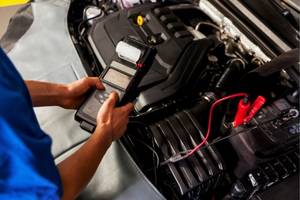Introduction
Does the term engine control module seem like something out of an advanced robotics class? It might sound complex, but don't worry—we're here to clarify it. Imagine your vehicle's engine as a high-performance symphony; the ECM is the conductor, ensuring that every part of the engine works in harmony. This small yet powerful component oversees critical functions such as fuel injection, ignition timing, and emission control. In essence, the ECM is the brain of your engine, making split-second decisions to optimize performance and efficiency. Join us as we dive into what makes this piece of technology so important, common issues that might arise, and how to keep it running smoothly.
1. Engine Control Module: An Overview
Let's start from the beginning. So, what exactly is this engine control module? It's essentially your vehicle's brain—obviously not the soft grey substance you're thinking of, but an equally impressive piece of technology.
The engine control module (ECM)—also known as the engine control unit (ECU)—is a type of electronic control unit that controls and regulates the functioning of your engine. From fuel injection and emission systems to ignition timing and transmission systems, the ECM is the boss—calling the shots and ensuring your vehicle runs smoothly.
But how does it do this, you might ask? Here's the lowdown:
- The ECM receives information from a number of sensors located throughout your car. These sensors monitor everything from temperature and air pressure to the amount of oxygen in the exhaust.
- Equipped with this data, the ECM then decides the best course of action. Maybe more fuel needs to be injected, maybe the spark timing needs to be adjusted, or perhaps the turbocharger needs a little nudge.
- Once it's made up its mind, the ECM sends commands to various engine parts to execute the decisions it has made.
So, in essence, the engine control module is the puppet master of your engine, controlling all the strings and pulling the right ones for optimal performance.
Just imagine trying to keep track of all those variables yourself while driving. Yikes! Thank goodness for the ECM, right? But what happens when this essential component starts having problems? Well, that's where understanding common engine control module problems comes in handy. But we'll save that for another day, and another blog. For now, just remember this—your ECM is your engine's best friend, and it's your job to keep it happy and healthy.
A well-functioning engine control module equates to a well-performing vehicle. So, let's raise a virtual glass to this unsung hero under the hood, the ECM! Now, who said learning about car parts couldn't be fun?
2. Identify Common Engine Control Module Problems
Alright, we all know by now that the engine control module is the central component of your vehicle. But, like all heroes, sometimes they stumble too. So, let's uncover some common issues that can plague your ECM and the signs that might give them away.
One of the first signs that your ECM might be taking a sick day is if your engine starts acting up. Misfires, reduced power, or even difficulties starting—these are all symptoms that your engine control module might be in danger and need your immediate attention. But how can you tell? Here's how:
- Your engine might struggle to start or not start at all.
- You may notice a decrease in fuel efficiency.
- Your vehicle could suddenly start stalling or misfiring.
- You might experience a loss of power when accelerating.
If you start noticing these signs, it might be time to look at the engine of your vehicle and check on your ECM.
Check Engine Light
Another telltale symptom of ECM trouble is the dreaded check engine light. Now, we've all seen it—that little orange light on the dashboard causing you to break out in a cold sweat. But did you know it could be your ECM trying to tell you something's wrong? Here's what you need to know:
- The ECM monitors various engine functions. If something's off, it often triggers the check engine light.
- While this light can be triggered by a variety of issues, an illuminated check engine light could indicate ECM problems.
If your check engine light is on, it might be your ECM's way of shouting, "Hey, I need your attention here!"
Transmission Issues
Did you know your ECM also plays a role in controlling your transmission? That's true, and when it's not doing its job properly, you might experience some transmission-related issues. Here are a few symptoms to look out for:
- Your vehicle might have trouble shifting gears.
- You could notice a delay in the engagement of your transmission.
- Your car may go into 'limp mode', restricting speed to prevent further damage.
If your vehicle starts showing these symptoms, it might be a sign that your ECM is in need of a little TLC.
Remember, these are just a few common engine control module problems that you might encounter. However, it's always best to consult with a professional if you suspect your ECM might be in trouble. After all, they're the doctors of the automotive world, right? So, arm yourself with this knowledge, and make sure your vehicle's brain, the ECM, is always in good shape!
3. Troubleshoot Your Engine Control Module
So, your engine control module might be malfunctioning, but what can you do about it? Before you call your mechanic, there are a few things you can try to solve the issue right at home. Let's dive in!
ECM Reset
Did you know that, just like your computer, sometimes your ECM needs a simple restart to get back on track? That's true! A reset can clear any trouble codes and give your ECM a fresh start. This is how it's done:
- Disconnect the battery cables from the battery. Remember, safety first!
- Wait for about 20 minutes. This gives the ECM enough time to reset.
- Reconnect the battery cables. And voila! Your ECM should be reset.
Remember, this is a basic troubleshoot. If the issue persists, you might need to roll up your sleeves and dive a little deeper.
Error Code Reading
Your ECM communicates problems through error codes. By reading these codes with an OBD-II scanner, you can get a better idea of exactly what problem your ECM is facing. Here's how it works:
- Connect an OBD-II scanner to the diagnostic link connector in your vehicle. This is usually located under the driver's side dashboard.
- Follow the instructions provided with your OBD-II scanner to read the error codes.
These codes can give you a hint about what's wrong with your ECM, and they're a great starting point for troubleshooting.
Professional Diagnostic
Sometimes, despite all your possible efforts, the problem could be too complex to solve at home. In this case, it might be time to let the pros step in. A professional diagnostic test can provide a detailed analysis of your ECM's health.
- A professional automotive technician can perform a thorough diagnostic test on your ECM.
- They can identify any underlying issues and suggest the best course of action.
In the end, your vehicle's health is of utmost importance, and sometimes professional help is the best route to take.
Troubleshooting your engine control module can be a difficult task, but with a bit of knowledge and patience, you can identify and potentially remedy the issue. However, it's important to remember that not all problems can be solved at home. Don't hesitate to seek professional assistance when needed. Your vehicle will thank you!
4. Maintain Your Engine Control Module for Optimal Performance
Just like you take care of yourself to stay healthy, your engine control module too needs some attention and care to perform at its best. Let's look at how you can keep your ECM in top-notch condition.
Regular Vehicle Servicing
You've heard it before, and I'll say it again: Regular servicing or maintenance is key to keeping your vehicle—and its ECM — in top shape. Why is that, you ask?
- Regular oil changes ensure that the ECM doesn't have to deal with a dirty engine.
- Timely servicing can detect potential ECM issues before they become a major headache.
- Technicians can update ECM software, if needed, during regular servicing.
Remember, prevention is better than cure, so don't skip those service appointments; schedule a date with your service provider.
Keep It Clean
Our engines are exposed to a lot of dirt and dust, and your ECM is no exception. Keeping your ECM clean can help it function more effectively. Here's how:
- Clean your vehicle's engine compartment regularly to avoid dirt build-up.
- Ensure the ECM's connections are clean and corrosion-free.
A little cleaning can go a long way in maintaining your ECM's performance.
Avoid Moisture
Water and electronics don't mix. And your ECM is no exception. Avoid exposing your ECM to moisture to ensure it functions optimally.
- Make sure your vehicle's seals and gaskets are in good condition to prevent water intrusion.
- Avoid driving through high water, if possible.
Remember, a dry ECM is a happy ECM!
Maintaining your engine control module doesn't have to be difficult. With regular servicing, a bit of cleaning, and keeping moisture at bay, you can ensure that your ECM is always ready to perform at its best. Trust me, your vehicle — and your wallet — will thank you for it.
Conclusion
The engine control module is truly the unsung hero under your vehicle's hood. It regulates the engine's performance by making accurate adjustments based on real-time data, ensuring your car runs efficiently and reliably. From handling engine performance issues to troubleshooting and maintaining your ECM, understanding its role can empower you to keep your vehicle in top shape. Regular servicing, clean connections, and avoiding moisture are all essential for maintaining this critical component. Remember, a well-functioning ECM is key to a smoothly running engine, so give it the care it deserves, and it will reward you with smooth and reliable performance.
FAQs on
Comprehensive Guide to Understanding Your Engine Control Module in 2025
-
1. What exactly does the engine control module (ECM) do?
Ans.
The ECM is essentially the brain of your vehicle’s engine. It controls and regulates various engine functions, such as fuel injection, ignition timing, and emission control, based on data received from sensors throughout the vehicle.
-
2. How can I tell if my ECM is having problems?
Ans.
Symptoms of ECM issues may include poor engine performance, misfires, reduced fuel efficiency, a check engine light, and transmission problems like difficulty shifting gears or a delay in engagement.
-
3. What should I do if my check engine light comes on?
Ans.
If your check engine light flickers, it’s important to get your vehicle checked as soon as possible. The light can indicate various issues, including potential problems with the ECM. Using an OBD-II scanner to read the error codes can provide more information about the issue.
-
4. Can I reset the ECM myself?
Ans.
Yes, you can perform a basic ECM reset by disconnecting the battery cables for about 20 minutes and then reconnecting them. This can clear trouble codes and give the ECM a fresh start, but it’s only a temporary fix. Persistent issues may require professional diagnosis.
-
5. How often should I have my ECM checked or serviced?
Ans.
Regular vehicle servicing is important for maintaining your ECM. Ensure that your vehicle undergoes regular maintenance as recommended by the manufacturer. During servicing, technicians can check the ECM's performance, update software if needed, and address any emerging issues.
-
6. What can I do to prolong the life of my ECM?
Ans.
To keep your ECM in good condition, regularly clean your vehicle’s engine compartment, ensure connections are free from corrosion, and avoid exposing the ECM to moisture. Regular vehicle maintenance will also help identify and address potential issues before they become serious problems.


